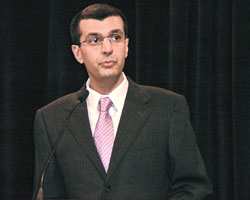Tire firms could overcome challenges together
 Akron, Ohio - Two towering issues the tire industry faces—the business’ impact on the environment and the growing scarcity of raw materials—scream for collaboration, rather than a go-it-alone approach.
Akron, Ohio - Two towering issues the tire industry faces—the business’ impact on the environment and the growing scarcity of raw materials—scream for collaboration, rather than a go-it-alone approach.
That’s the plea of Neeraj R.S. Kanwar, the No. 2 executive at Apollo Tyres Ltd. While India’s lar-gest tire manufacturer itself took off after declaring independence from one of the big players, its vice chairman, joint managing director and chief operating officer said it will take a cooperative approach by the industry to solve environmental and supply dilemmas.
“Standing amongst some of the best brains in our industry, I would like to appeal today for a more collaborative approach to our work,” he said in a keynote address Sept. 17 at the International Tire Exhibition and Conference in Akron. “We are currently in various silos, chipping away at finding small and large solutions. In the process investing resources of man and money and looking to keep the gains to ourselves.”
That doesn’t make sense, Kanwar said in his speech and an interview preceding it, because the advantage of making a technological gain is so short-lived today.
“Given this, does it not make more sense to pool our meager resources for higher and faster gains, especially in an industry with low profit margins?”
Kanwar sees conferences like ITEC—which drew more than 2,100 tire industry participants to Akron for the three-day, Rubber & Plastics News-sponsored event—as “learning platforms where some of the best brains are presenting papers on some of the most relevant areas of our work.”
“My question to you is, can we look at leveraging forums like this to learn from the leaders even as we compete in the marketplace?” he asked. “Can we as an industry break the mold and look at a collaborative approach that allows us to invent, innovate and implement faster?”
Problems to solve
Apollo has had to deal with problems common to all the world’s tire makers, even though it has fared better than most. When oil hit $140 a barrel, with the resultant effect on tire makers, Apollo found itself in what Kanwar called a terrible situation.
“Our hands were tied and it was extremely difficult to raise product prices to bridge the yawning gap,” the executive said. The company embarked on a massive “cut out the fat” campaign.
Characteristically, it was a decentralized decision-making approach initiated at individual and department levels “without any debate or waste of time,” Kanwar said. “Implementation was quick and efficient” with positive results that “just might save this year for us.”
Apollo has been growing briskly since embarking on what Kanwar called an “audacious goal” of increasing sales from $750,000 in 2005 to $2 billion four years later. It’s up to the $1.2 billion-$1.3 billion level this year.
Growth is continuing, he said, although the global problems of energy costs, raw material prices and availability and slumping markets means Apollo won’t advance at the annual 18-percent pace of the past six years.

For more information on Klean Industries Inc wholly own subsidiary, Mobius Enviro-Solutions Inc. - the world’s only integrated tire manufacturing and commodity recovery processing system please feel free to contact us and view this new release, Klean Industries unveils plans for revolutionary integrated tire manufacturing and pyrolysis resource production plant.
Nothing impossible
Kanwar said Apollo’s rise starts at the top. His father, Onkar Kanwar, chairman and managing director of the tire maker and son of its founder, “is probably the youngest person in our company. He is restless, impatient and frowns on the word ‘impossible.’ “
His style of management is to set a goal and get out of the way. “Our chairman’s oft-repeated statement is ‘change is the only constant.’ He wishes to create an institution which has made transformational change into a habit.”
A sea change occurred when Apollo gave up its long affiliation with General Tire & Rubber Co. in the mid-1980s. Using General’s specifications meant Apollo was making American tires for Indian roads, Kanwar said.
“And if you have driven through this country of ours, it will soon be apparent to you that India is one of the most punishing tire markets in the world,” he said. “Driving styles range from crazy to hilarious. Infrastructure varies from some of the best roads to what resembles a lunar surface. Loading conditions range from standard to overloads of 80 to 120 percent. Climatic variables bring in that extra edge to the challenge.”
By doing it on its own—a process of inventing, innovating and implementing—Apollo now holds 50 percent of India’s bias-ply market, which contributes 80 percent of the nation’s tires sales, Kanwar said.
Apollo’s ambitions are to grow regionally and globally. The company, which operates six plants in India and southern Africa, has new plants going up in Limda, Gujarat state, and Chennai, Tamil Nadu.
The Dunlop operations in South Africa and Zimbabwe the firm bought in 2006 are doing well, Kanwar said. Those plants supply South America and European markets, and it is in Eastern Europe where Apollo is planning its next facility.
“Europe is my focus area,” Kanwar said. “Apollo needs a facility to look after Europe and our customers.”
The company was set to build a factory in Hungary, but a squabble between local political parties killed that deal. The company is looking for another site for the factory in Eastern Europe, with Hungary and Slovakia being considered.
By Edward Noga
You can return to the main Market News page, or press the Back button on your browser.

